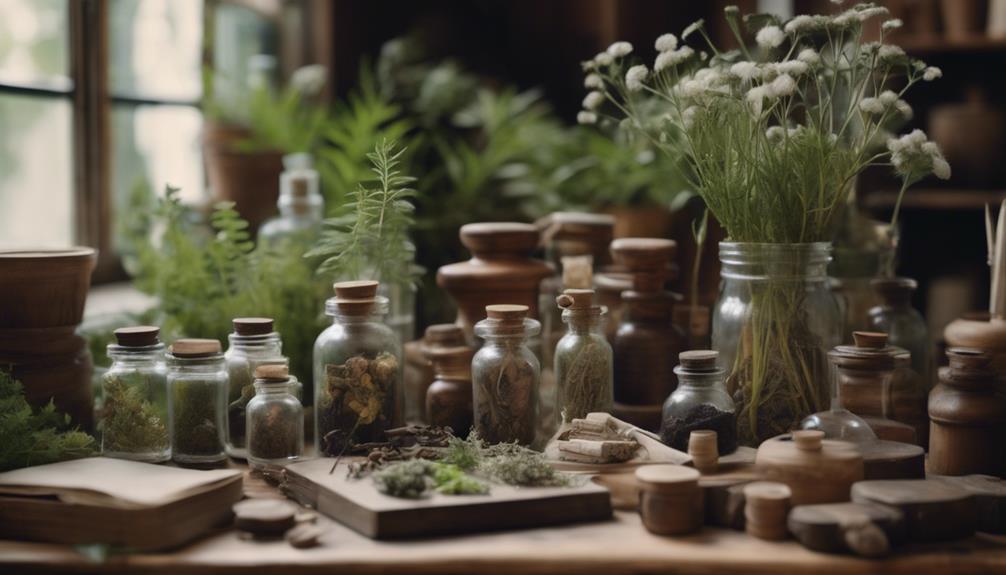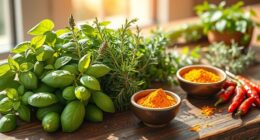As we explore the content of a herbalism degree, we find that it encompasses a thorough understanding of foundational principles, including the therapeutic properties of plants and their role in promoting health and wellness. We examine diverse herbal medicine systems worldwide, such as traditional Chinese medicine and Ayurveda. We learn to craft effective herbal remedies, analyze research, and develop holistic support plans. Our program also covers career development opportunities, including roles like herbalists, product developers, and wellness consultants. As we move forward, we'll uncover the intricacies of herbalism, discovering how this ancient practice can inform modern healthcare.
Key Takeaways
• A herbalism degree covers the foundational principles of herbalism, including plant properties, interactions with the human body, and traditional medicine systems.
• The program explores various herbal medicine systems worldwide, such as Traditional Chinese Medicine, Ayurveda, and Western herbalism.
• Students learn to craft effective herbal remedies, including teas, tinctures, and salves, and understand dosing strategies for different age groups and health needs.
• The degree program incorporates research and analysis of herbal medicine, including safety and efficacy, biochemical composition, and potential interactions.
• The curriculum prepares students for diverse career paths, including herbalist, product developer, wellness consultant, and educator, with opportunities for specialization and certification.
Foundational Principles of Herbalism
As we explore the world of herbalism, we discover that understanding the therapeutic properties of plants and how they interact with the human body is a fundamental principle of this holistic practice. This foundational principle is essential in therapeutic herbalism, where we recognize that plants have unique properties that can be harnessed to promote health and wellness.
We learn that traditional medicine systems, such as Ayurveda and Traditional Chinese Medicine, have long utilized plants to prevent and treat various health conditions. In herbalism, we focus on understanding how these therapeutic properties interact with the human body, enabling us to create effective remedies that address specific health concerns.
Herbal Medicine Systems Worldwide

We deepen our understanding of herbalism by exploring the diverse herbal medicine systems used worldwide, recognizing that different cultures have developed unique approaches to harnessing the therapeutic properties of plants.
As we immerse ourselves in the world of herbalism, we discover the richness of traditional practices that have been refined over centuries.
- In Traditional Chinese Medicine, herbal remedies are used to balance the body's energy, or 'qi.'
- In Ayurvedic medicine, plants are used to promote health and wellness based on an individual's unique constitution.
- In Unani medicine, herbs are used to treat a range of health conditions, from digestive issues to skin problems.
- In Western herbalism, plants are used to support the body's natural healing processes.
- In Amazonian herbalism, indigenous communities have developed a deep understanding of the medicinal properties of rainforest plants.
Through our studies, we learn that each system offers a distinct perspective on the use of medicinal plants, and that Herbal Medicine Schools provide a thorough education in these diverse traditions.
Herbal Remedies and Dosing Strategies

Through our herbalism degree program, we thoroughly explore the art of crafting effective herbal remedies and dosing strategies that cater to diverse age groups and health needs. We learn how to manufacture various herbal remedies, such as teas, tinctures, salves, compresses, and steams, to address different health concerns.
Our curriculum covers researching traditional uses and scientific evidence supporting medicinal plants, enabling us to create targeted remedies. We delve deeply into the world of materia medica, studying the properties and uses of top herbal medicines commonly used in the United States. This in-depth approach helps us understand herb habitats, cultivation, harvesting, indications, contraindications, and dosing strategies.
Herbal Medicine Research and Analysis

By delving into the domains of herbal medicine research, we uncover the intricacies of analyzing safety and efficacy of herbal remedies. As we explore the world of herbal medicines, we realize that research plays a crucial role in understanding the traditional uses and scientific evidence of medicinal plants. Our herbalism degree program teaches us to synthesize research findings to create holistic herbal support plans that integrate emerging research in herbal medicine for best wellness strategies.
In our pursuit of evidence-based knowledge, we learn to analyze research to enhance our understanding of herbal therapies. This involves:
- Evaluating the efficacy of herbal remedies in treating various health conditions
- Investigating the potential interactions between herbal medicines and conventional drugs
- Exploring the traditional uses of medicinal plants in different cultures
- Analyzing the biochemical composition of herbal remedies
- Integrating research findings into our herbalism practice to provide best wellness strategies
Herbalism Career Development and Opportunities

In addition to applying our knowledge of herbal medicine research and analysis, we're poised to explore the diverse and rewarding career paths that an herbalism degree can offer. With a strong foundation in herbalism, we can pursue roles like herbalists, botanical product developers, holistic health practitioners, wellness consultants, or herbal pharmacy managers.
We can also enhance our conventional medical practice by integrating herbalism, allowing for a more holistic approach to patient care. Moreover, we can specialize in areas like growing, wildcrafting, manufacturing, teaching, or counseling, offering a range of career concentrations.
Ethnobotanists, who study plant use in different cultures, can contribute to the preservation of traditional folk medicine globally and aid in the classification of medicinal herbs. To further establish credibility and professionalism in the field, we can obtain certifications, such as the American Herbalists Guild certificate program, and develop expertise in medical terminology.
Frequently Asked Questions
What Do Herbalists Major In?
When we think about herbalists, we often wonder what they study to become experts in their field.
As it turns out, we extensively research a range of subjects that may surprise you.
We immerse ourselves in botany to understand plant biology, pharmacology to learn about medicinal properties, and physiology to grasp how herbs interact with the body.
We also explore biochemistry and nutrition to fully comprehend the effects of herbal remedies on human health.
What Does Herbalism Involve?
We delve into the field of herbalism, which involves the study of medicinal plants and their properties, as well as their traditional and modern uses in treating various health conditions.
It's about understanding how plants can be used to prevent and treat illnesses, and developing a deep respect for the natural world.
What Is the Study of Herbalism?
As we step into the ancient apothecary, surrounded by dusty jars of mysterious potions, we ask ourselves: what's the study of herbalism?
Simply put, it's the exploration of medicinal plants and their traditional, cultural, and scientific applications.
We explore the world of botany, pharmacology, and physiology to understand how herbal remedies can promote health and wellness.
What Skills Do You Need to Be a Herbalist?
We need a solid foundation in botany, pharmacology, physiology, and biochemistry to be effective herbalists.
Identifying, cultivating, and harvesting plants are essential skills, as are clinical assessment and recordkeeping abilities.
We must understand herbal medicine safety, efficacy, and dosage to provide quality care.
Strong communication and education skills are also crucial for working with clients and educating them on herbal remedies.
Conclusion
As we explore the world of herbalism, we uncover a rich tapestry of ancient traditions, scientific inquiry, and holistic healing. Like a master herbalist carefully blending botanicals, our examination of foundational principles, global systems, remedies, research, and career paths weaves together to form a thorough picture of this ancient art.
With each thread, we strengthen our understanding of herbalism's vast potential to transform lives and foster a deeper connection with nature.










